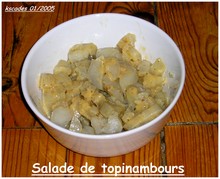If you're in the north midwestern United States or in Canada (I presume) and you're struggling to eat locally this time of year, it's helpful to know some French.
I don't know what to do with "Spanish radishes" that feel nothing like radishes and "Jerusalem artichokes" that look more like ginger than artichokes. But that's what the Minnesota co-ops are offering from local farms!
I'd all but given up on eating fresh food like a good seasonal shopper any time before late April--last night I hunkered down with greens out of a can, spaghetti out of a box, and tofu out of a box all mixed together. If I can't do local food that has to be prepared before tasting good, well, at least I can do long-shelf-life ingredients that have to be prepared before tasting good. After all, an addiction to 5-minute prep time kept me from preparing as much local food last summer as I would've liked.
But, looking up "jerusalem artichoke" after reading an article that indicated celery root, another one of those co-op mystery items, could be used as a main ingredient (puréed), I stumbled upon a picture labeled "topinambours."
That changed everything! The word in French isn't of the form, "place that isn't here" + "vegetable we do eat here," so the chances of Frenchies considering this vegetable something as normal as we consider cauliflower seemed high!
(I'm also convinced that we're more intrigued by the flavor of lime than they are because we have a distinct word for it--they call it a "green lemon," and I swear they flavor things with an attitude of, "lemon or lime...doesn't matter" more than we do.)


Sure enough, a Google Images search on "topinambours" turned up Jerusalem artichokes cooked in cream, Jerusalem artichokes shredded up & made into cake, Jerusalem artichokes cooked and cooled and covered in mustard dressing as a form of salad...
Just look at those lovely pictures. They're so messy...so obviously homemade with ease!
I mean, there's just something about "[rare vegetable name] salad" that makes people around me think of using [rare vegetable name] as a garnish on a salad of lettuce rather than using it as the only ingredient of substance. Much as we think of "tomato salad" or "carrot salad" as cold dishes consisting of tomatoes or carrots, the French think of "topinambour salad" as a cold dish consisting of Jerusalem artichokes.
I've experienced this, "Wow, it's nice to know the word for the food [or way of preparing food] in two languages" phenomenon before. I'm sure it holds true throughout more languages, but unfortunately, I don't know any besides French. How much more simple could the "weird local vegetables" seem to me if I knew the words for them in Wolof or Tibetan?
 Post Calendar
Post Calendar Close
Close
No comments:
Post a Comment